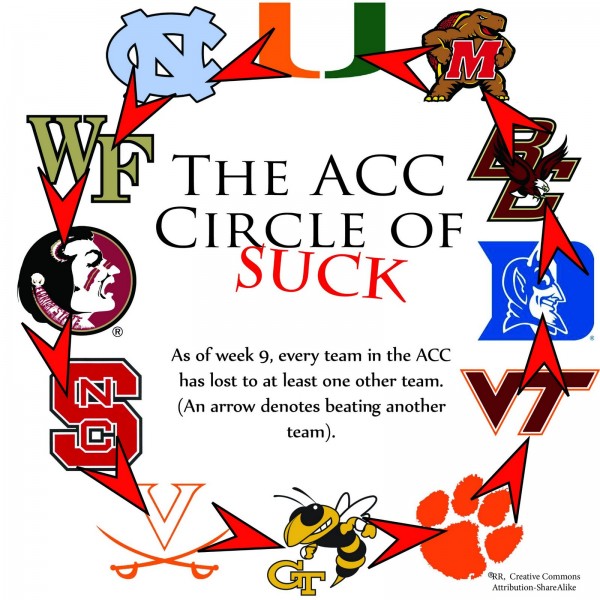Florida State, Conference Realignment, and the ACC…
Posted by mpatton on May 15th, 2012Florida State president Eric Barron released a statement Monday with his response to conference realignment rumors — specifically focused on Florida State Board of Trustees chair Andy Haggard‘s comments from last week. To summarize, Haggard wants out of the ACC. He pointed out that the conference’s attachment to Tobacco Road and basketball in general represents a fundamental chasm between the Seminoles and their current conference. He also pointed to the ACC’s new television deal, which reportedly will eventually pay the schools an extra $4 million dollars per school but still lags behind the Pac-12, Big 12, the Big Ten and SEC. Haggard also erroneously pointed to the ACC’s treatment of third-tier television rights as proof of the league’s anti-football bias (he claimed schools got to keep unused basketball games and not football games, but the schools actually do not have rights to either).

Florida State Eric Barron Wants to Stay in the ACC. (AP Photo/Phil Coale)
Barron’s statement sided with the ACC, citing increased travel costs, lower ticket sales and the high exit fee as financial reasons to avoid a deal with the Big 12. He also highlighted Texas’s influence on the conference, losing the rivalry with Miami, and academics. Barron’s statement also falsely suggested that the Big 12 will not share revenue equally: Unlike the old Big 12 deal, the new deal will include equal revenue sharing except for third-tier rights which belong to the schools (which unlike the ACC includes unused basketball and football games). Barron also failed to acknowledge that Florida State joining the Big 12 would improve the conference’s television deal, so the current $3 million dollar difference would likely increase. Additionally, the Big 12 may share travel costs but I couldn’t confirm that one way or another. For the Florida State fan perspective, Tomahawk Nation is the best source for conference realignment (and really everything else). Bud Elliott wasn’t impressed with Barron’s statement. It’s clear that a majority of Florida State fans are at least interested in what the Big 12 has to offer. On the other side of the argument, Chadd Scott makes strong arguments for the Seminoles staying in the ACC and on the specifics of each deal.
This conversation revolves around football, as it clearly drives athletic department budgets and television deals far more than basketball (which drives the NCAA as much as anything else). In my opinion comparing the ACC to the Big Ten or SEC is fruitless, as those two conferences are clearly a cut above the ACC, Big 12 and Pac-12 on many levels. It’s also not productive to compare the ACC with the Big East, a conference forced to find mid-major additions on top of dealing with a plurality of basketball-only members. From the ACC perspective, losing Florida State would be catastrophic. The Seminoles not only are the conference’s hallmark football program, they also open the door to Florida recruiting (critical in football), and at least recently they possess the third best basketball program (with this year’s ACC championship sitting atop their resume) to go with successful Olympic sports across the board.
From a football perspective Florida State may not be close to the power it was in the 1990s, but it’s still the most recognizable ACC team on the gridiron. Miami loses touch with its national fan base with every passing mediocre season. Only Clemson and Virginia Tech drew much national coverage last year. The ACC’s mediocrity on the gridiron should act as a double-edged sword for the Seminoles: While it may hurt the overall television deal, FSU should consistently dominate the league. Unfortunately, that hasn’t been the case (largely thanks to the decline seen over Bobby Bowden’s last few years and a couple of over-hyped recruiting classes). Besides Notre Dame, Texas, Michigan and USC, very few brands in college football can keep a huge national audience after years of national title irrelevance. The Seminoles haven’t won the ACC since 2005 and haven’t won a BCS bowl game since their last national championship in 2000.
The reason the ACC can’t afford to lose Florida State is because individual following is far more important for television deals than total viewership. It shocked me that the ACC has the third highest average number of TV viewers, significantly behind the SEC and Big Ten. The league’s 2.65 million viewers dwarfed the 2.35 and 2.1 million viewers for the Big 12 and Pac-12, respectively. But the contracts aren’t about average viewers.

The 2011 ACC Football Season in a Nutshell. (Credit: unknown via Kegs 'N Eggs)
The Big 12 isn’t getting a blockbuster deal because Iowa State attracts viewers; it’s because Texas and Oklahoma are two of the premier college brands in the country, and Fox and ESPN can’t afford to not show them. Even if showing the Sooners and Longhorns means overpaying for everything else, ESPN needs big games to justify its comprehensive coverage (think about how much ESPN pays for Monday Night Football). The same is true for Fox, who has an extensive relationship with Oklahoma (part of the third-tier rights) outside of games. To drive the money up further, the Big 12 had two media partners renegotiating — essentially bidding — for broadcasts. The ACC’s deal was only with ESPN. A similar ESPN/Fox bidding war (with newly relevant NBC Sports), along with grossly inflated valuations of local networks, drove the newest Pac-12 contract through the roof.
So what is the bottom line?
I think Florida State should stay in the ACC unless by some miracle it receives an invitation from the SEC. A move to the Big 12 looks more like a short-term fix than a long-term solution to the Seminoles’ budget problems. While the influx of immediate money would help, losing current rivalries would hurt casual fans and possibly estrange them altogether if Florida State doesn’t reclaim elite status shortly thereafter. Another road block would be the stiffer competition FSU faces in conference play. Would a dominant Florida State team in the ACC fare better with audience than an above average team in the Big 12? I think so.
The conference bias argument is moot: The Big 12’s Texas bias at least equals the ACC’s North Carolina bias. The exit fee isn’t a deal-breaker but it doesn’t help either. Academics are clearly in the background but aren’t totally irrelevant. Also don’t ignore the relative influence and power Florida State wields as a top football program that’s been in the ACC since before the Big 12 existed. The better Florida State is at football, the more influence it will have in the ACC and on the television deal.
The ACC didn’t keep the Seminoles from dominance in the 1990s, and it’s not keeping them from dominance now. The ACC has plenty of talent (just check the NFL Draft boards). The league’s deal is disappointing, but it reflects the ACC’s insignificance over the last decade on the gridiron. Like the conference needs multiple contenders in basketball to go with one or two perennial dominant teams, the conference needs some combination of Florida State, Miami, Clemson and Virginia Tech to be nationally relevant (Top 10 or so) every year with at least one other school turning some heads (look to Georgia Tech and NC State most of the time).










































Fair piece that mostly agrees with my stance on the issue. One side note is that television revenue in the Big 12 is indeed unequal. In the ACC all third tier mbb and fb games are included in the ESPN deal, in the Big 12 (and SEC iirc) the rights to those games, along with wbb and Olympic sports, are held by the schools. For schools like Florida and Texas these can be worth quite a lot (the Longhorn Network and all). For schools like Wake Forest and BC they aren’t worth jack shit.
The ACC being North-Carolina and basketball centric is a particularly bullshit reason to leave for the Big 12 though. DeLoss Dodds at Texas is the defacto Big 12 commissioner, and the conference didn’t add FSU, BC, or Miami for basketball.